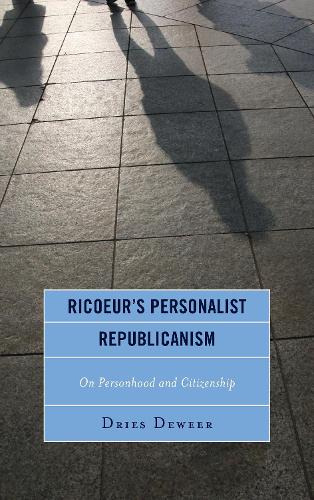
Ricoeur's Personalist Republicanism: Personhood and Citizenship
(Hardback)
Publishing Details
Ricoeur's Personalist Republicanism: Personhood and Citizenship
By (Author) Dries Deweer
Bloomsbury Publishing PLC
Lexington Books
14th August 2017
United States
Classifications
Professional and Scholarly
Non Fiction
Social and political philosophy
194
Physical Properties
Hardback
256
Width 157mm, Height 239mm, Spine 25mm
567g
Description
Moral and political convictions never stand alone. They are always connected to an underlying view of mankind. Liberalism, which currently predominates, is connected to a focus on the free individual. Marxism thinks of man in terms of class struggle, determined by economic relationships. Halfway the twentieth century a powerful alternative came about, by the name of personalism. This term stood for a social and political thought based on the concept of the human person. This concept stresses that a human being only becomes human in relationship with others and in a commitment to values that go beyond ones individual interests. Although personalism has an important influence in western society, in philosophical circles it is often regarded as dead and gone. This tension brings Paul Ricoeur to the fore as an interesting interlocutor, because he was considered a representative of personalism in his younger years, while he later on also supported fatal criticisms of original personalism. This book investigates to what extent the thought of Ricoeur bears a continuing stamp of personalism that allows him to instigate a personalist perspective within contemporary political philosophy. The final result lies on three fronts. First, there is more clarity in the status of personalism in contemporary philosophy, as Ricoeurs hermeneutical phenomenology shows that there are still viable means to elaborate the core ideas of personalism. Second, a personalist kind of republicanism is shown to provide a valuable input in the contemporary philosophical debate on citizenship. Finally, the most tangible result is a deeper understanding of the oeuvre of Ricoeur, in the sense that this book shows that personalism is an important and above all underestimated perspective to understand his entire work.
Reviews
Ricoeurs Personalist Republicanism: Personhood and Citizenship by Dries Deweer invites us to rediscover the thought of Ethics and politics of Ricoeur. It is a work remarkable for its clarity and for the intellectual horizon that opens the philosophy of Ricoeur. The great interest of the book is to show that a certain influence of personalism continues to pursue its work in the later political and ethical works of Ricoeur. Deweer's work is both a very good introduction to Ricoeur's thought for the novice and presents an original perspective for the specialist. -- Johann Michel, L'cole des Hautes tudes en Sciences Sociales
Our societies need a new way of understanding politics and the foundations of democracy. Dries Deweer has found in Paul Ricoeur an important source of inspiration for these problems, and presents them with lucidity and brilliance. -- Juan Manuel Burgos, Universidad CEUSan Pablo
Dries Deweers new book, Ricoeur's Personalist Republicanism, is incisive in two directions: looking forward and looking back. Looking back, the volume is illuminating in revealing the influence of personalism and its philosophy of the interrelation between person and community on Paul Ricoeurs philosophy of the self. At the same time this look back shows Ricoeurs critique of the limits of personalism and his extension of the relational self as constituted within social and political institutions. The look forward demonstrates how Ricoeurs theory of the relational self introduces a form of republicanism that at once mediates between liberalism and communitarianism and also advances beyond existing approaches to republicanism. Both the look forward and the look back are innovative and very much welcome. -- George H. Taylor, Professor of Law, University of Pittsburgh
This book is a very important contribution in several domains: (1) in the field of Ricoeur-scholarship it presents a very original and knowledgeable focus on the early personalist influences and connects these to the later political reflections of Paul Ricoeur; (2) in the field of political philosophy, it helps to overcome the worn out opposition between communitarianism and liberalism through its brightly developed proposal for a personalist political philosophy, and (3) finally it challenges the political debate in a provocative way to refresh its ideological roots in stead of going under in the trivialities of pragmatism. -- Paul van Tongeren, Professor Emeritus at Radboud University Nijmegen and KU Leuven
Author Bio
Dries Deweer is assistant professor at Tilburg University.
